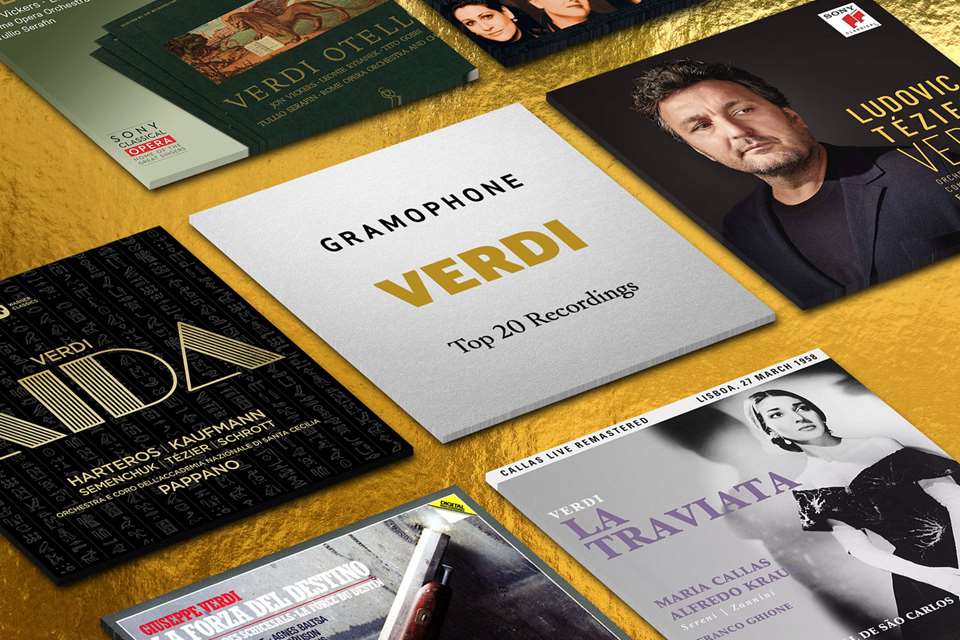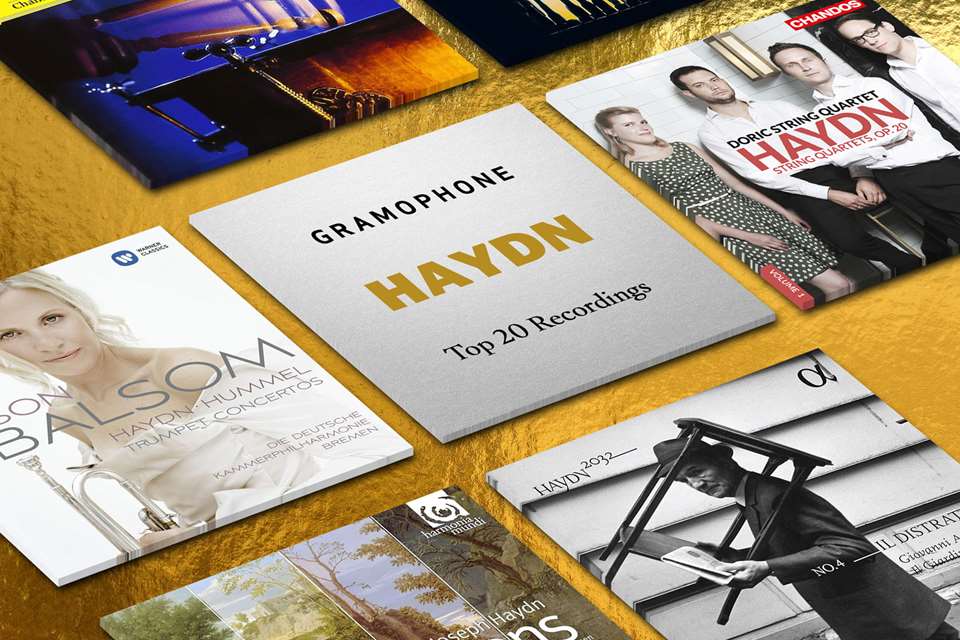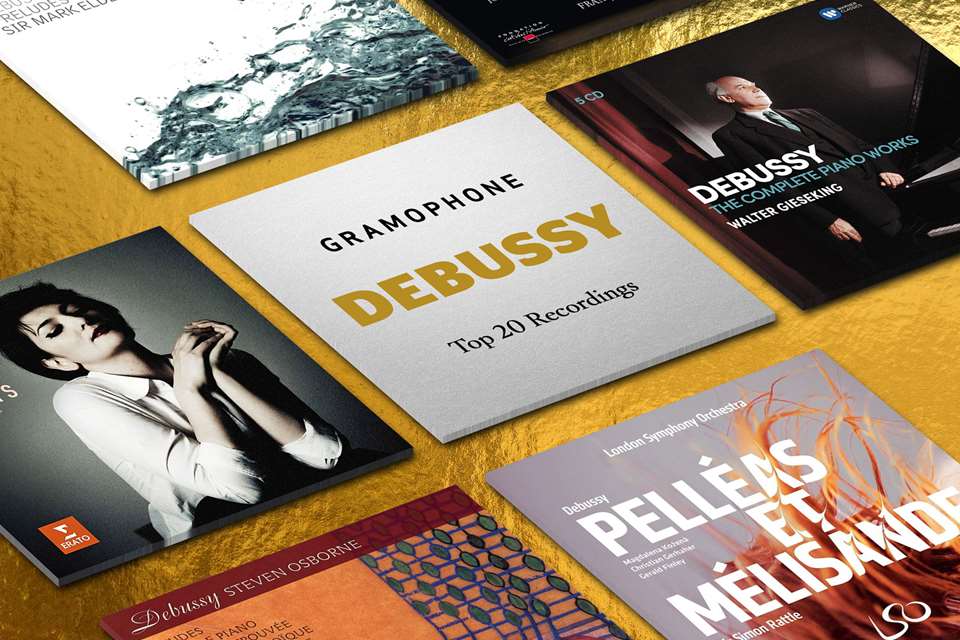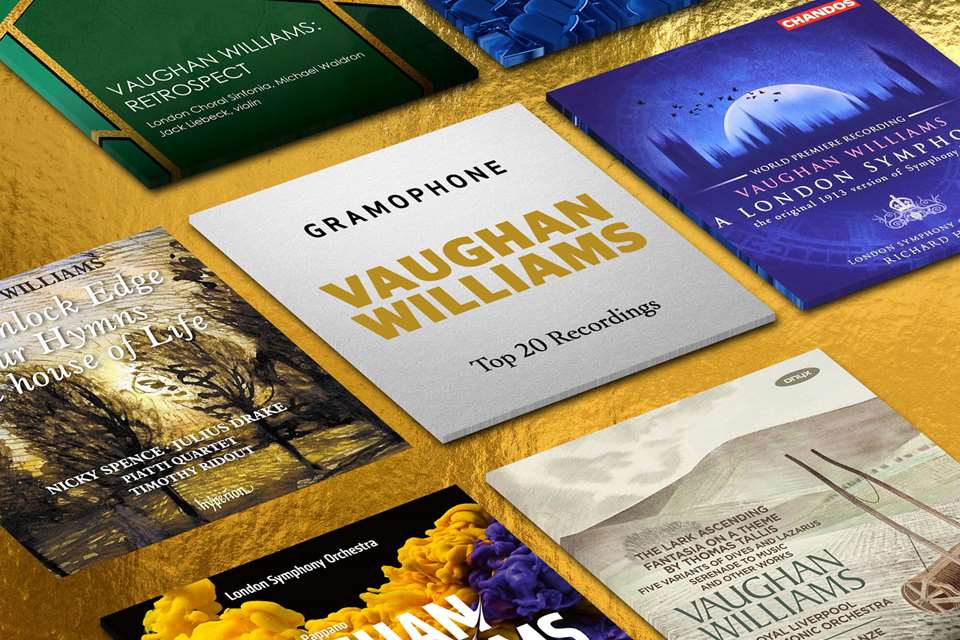Top 20 Puccini Recordings
Wednesday, May 1, 2024
Twenty great Puccini recordings, featuring Victoria de los Ángeles, Luciano Pavarotti, Angela Gheorghiu, Renata Tebaldi, Maria Callas, Leontyne Price and more

Whatever the atmosphere he wanted to create, Puccini’s sound world is unique and unmistakeable with its opulent yet clear-cut orchestration and a miraculous fund of melodies with their bittersweet, tender lyricism.
Reducing a century of Puccini recordings to a list of just 20 that everyone can agree on is impossible, but each of the recordings below says something distinctive and beautiful about Puccini's music, and each should be seen as a leaping-off point for further investigation and fresh discoveries.
And if you are interested in reading the best classical music reviews and discovering great new recordings every month then do consider subscribing the Gramophone, we'd love you to join us. Explore our subscription offers here: magsubscriptions.com
La bohème
Victoria de los Ángeles sop Mimì Jussi Björling ten Rodolfo Lucine Amara sop Musetta Robert Merrill bar Marcello John Reardon bar Schaunard Giorgio Tozzi bass Colline Fernando Corena bass Benoit, Alcindoro William Nahr ten Parpignol Thomas Powell bar Customs Official George del Monte bar Sergeant Columbus Boychoir; RCA Victor Chorus and Orchestra / Sir Thomas Beecham (Warner Classics)
(Recorded 1956)
‘Nobody has ever been so predestinately right for the role of Mimì than Victoria de los Ángeles: right both in vocal quality and in sheer involvement with every word and every musical phrase that Mimì utters. Beyond a certain point (usually a certain dynamic level) most sopranos stop being Mimì and simply produce the same sound that they would if they were singing Aida or Tosca. De los Ángeles rarely does this; even under pressure (and Beecham’s unhurried tempi do put her under pressure at times), the very difficulties themselves are used as an expressive and interpretative resource. Hers is the most moving and involving Mimì ever recorded.’
La bohème
Mirella Freni sop Mimì Luciano Pavarotti ten Rodolfo Elizabeth Harwood sop Musetta Rolando Panerai bar Marcello Gianni Maffeo bar Schaunard Nicolai Ghiaurov bass Colline Michel Sénéchal bass Benoit, Alcindoro Gernot Pietsch ten Parpignol Schöneberg Boys’ Choir; Chorus of the Berlin State Opera; Berlin Philharmonic Orchestra / Herbert von Karajan (Decca)
(Recorded 1972)
‘Pavarotti’s Rodolfo is perhaps the best thing he ever did: not only the finest recorded account of the role since Björling’s on the Beecham set, but adding the honeyed Italianate warmth that even Björling lacked. His latter-day image may tend to hide it but this recording is a reminder that Pavarotti was an artist of intelligence and delicacy as well as splendour of voice. His Mimì, Freni, sings beautifully and sensitively. Panerai is a strong, vividly acted Marcello. Harwood is an interesting Musetta: her tiny narration, in Act 4, of her meeting with the stricken Mimì is a gripping moment, and her waltz-song in Act 2 is a passionate (and irresistible) avowal to Marcello. Karajan is a great Puccini conductor who can linger over the beauties of orchestration without losing his grip on the drama or relaxing his support of the singers. There aren’t many operas of which a better case can be made for having more than one account in your collection. For a more modern La bohème to supplement the Beecham, this Karajan set must go to the top of the list.’ (Michael Oliver, November 1987)
Madama Butterfly
Angela Gheorghiu sop Madama Butterfly Jonas Kaufmann ten Pinkerton Enkelejda Shkosa mez Suzuki Fabio Capitanucci bar Sharpless Gregory Bonfatti ten Goro Raymond Aceto bass The Bonze Orchestra e Coro dell’Accademia Nazionale di Santa Cecilia / Antonio Pappano (Warner Classics)
‘Conducting the orchestra and chorus of the Santa Cecilia Academy, Antonio Pappano takes a less driven and melodramatic way with the score than Karajan in his three recordings (see below); it’s nearer in mood to Barbirolli, though there is no lack of passion at the great climaxes – just listen to the spine-tingling moment of the sighting of the ship. So, a fine new Butterfly, unlikely to topple some of the great recordings of the past but worthy to set beside them.’ (Patrick O'Connor, March 2009)
Madama Butterfly
Mirella Freni sop Madama Butterfly Luciano Pavarotti ten Pinkerton Robert Kerns bar Sharpless Christa Ludwig mez Suzuki Michel Sénéchal ten Goro Giorgio Stendoro bar Prince Yamadori Elke Schary mez Kate Pinkerton Marius Rintzler bass The Bonze Hans Helm bass Commissioner Vienna State Opera Chorus; Vienna Philharmonic Orchestra / Herbert von Karajan (Decca)
(Recorded 1974)
‘Movingly dramatic as Renata Scotto is on the Barbirolli set, Mirella Freni is even more compelling. The voice is fresher, firmer and more girlish, with more light and shade at such points as ‘Un bel dì’, and there’s an element of vulnerability that intensifies the communication. In that, one imagines Karajan played a big part, just as he must have done in presenting Pavarotti – not quite the superstar he became but already with a will of his own in the recording studio – as a Pinkerton of exceptional subtlety. Karajan draws ravishing playing from the Vienna Philharmonic strings, getting them to imitate the portamento of the singers in an echt-Viennese manner, which is ravishing to the ear.’ (Edward Greenfield, February 1975)
Tosca
Renata Tebaldi sop Tosca Mario del Monaco ten Cavaradossi George London bar Scarpia Silvio Maionica bass Angelotti Fernando Corena bass Sacristan Piero de Palma ten Spoletta Giovanni Morese bass Sciarrone Ernesto Palerini treb Shepherd Boy Orchestra dell'Accademia Nazionale di Santa Cecilia, Coro dell'Accademia Nazionale Di Santa Cecilia / Francesco Molinari-Pradelli (Decca)
(Recorded 1959)
‘Tosca returns to Rome! The combination of Renata Tebaldi’s sensuous, vibrant Tosca, Mario Del Monaco’s robust Cavaradossi and George London’s darkly sinister Scarpia is irresistible, coupled with Decca’s excellent early stereo recording, which gives the sense of a gripping night in the opera house.’ (Mark Pullinger, Gramophone Collection, August 2022)
Tosca
Maria Callas sop Tosca Giuseppe di Stefano ten Cavaradossi Tito Gobbi bar Scarpia Franco Calabrese bass Angelotti Melchiorre Luise bass Sacristan Angelo Mercuriali ten Spoletta Alvaro Cordova treb Shepherd Boy Dario Caselli bass Sciarrone Chorus and Orchestra of La Scala, Milan / Victor de Sabata (Warner Classics)
(Recorded 1953)
‘Wonderful as Gobbi’s and di Stefano’s performances are, and superbly dramatic as de Sabata’s conducting is, it is the performance of the unique Callas in the title-role that provides the greatest marvel, and here more than ever one registers the facial changes implied in each phrase, with occasional hints of a chuckle (usually ironic) more apparent than on LP. A truly Great Recording of the (last) Century.’ (Edward Greenfield, September 1985)
Tosca
Leontyne Price sop Tosca Giuseppe di Stefano ten Cavaradossi Giuseppe Taddei bar Scarpia Carlo Cava bass Angelotti Piero De Palma ten Spoletta Fernando Corena bass Sacristan Leonardo Monreale bass Sciarrone Alfredo Mariotti bass Gaoler Herbert Weiss treb Shepherd Boy Vienna State Opera Chorus; Vienna Philharmonic Orchestra / Herbert von Karajan (Decca)
‘Leontyne Price is the voluptuous Tosca on Herbert von Karajan’s first recording, vocally faultless and with beautiful attention to detail. Karajan swathes her in rich, occasionally cloying Viennese sound, but Giuseppe Taddei is a terrifying Scarpia, while Giuseppe Di Stefano makes an ardent lover.’ (Mark Pullinger, Gramophone Collection, August 2022)
Turandot
Birgit Nilsson sop Princess Turandot Franco Corelli ten Calaf Renata Scotto sop Liù Guido Mazzini bar Ping Franco Ricciardi ten Pang Piero De Palma ten Pong Bonaldo Giaiotti bass Timur Angelo Mercuriali ten Emperor Altoum Giuseppe Morresi bar Mandarin Chorus and Orchestra of Rome Opera House / Francesco Molinari-Pradelli (Warner Classics)
‘With the Birgit Nilsson, who is clearly the finest Turandot today and the most ringing heroic Italian tenor, Franco Corelli, this provides as near an ideal as one is likely to find along conventional Italian lines, richly lyrical, strong and dramatic.’ (Edward Greenfield, May 1966)
Turandot
Sondra Radvanovsky sop Princess Turandot Jonas Kaufmann ten Calaf Ermonela Jaho sop Liù Michele Pertusi bass Timur Michael Spyres ten Emperor Altoum Mattia Olivieri bar Ping Gregory Bonfatti ten Pang Siyabonga Maqungo ten Pong Orchestra e Coro dell'Accademia Nazionale di Santa Cecilia / Antonio Pappano (Warner Classics)
‘Pappano captures all the savagery of the score, its ceremonial pomp and oriental glitter magnificently recorded. It’s bloodthirsty stuff; even the pizzicato strings are laced with menace. The Santa Cecilia chorus, Covid-distanced, are terrifying, spanning the full stereo sound picture, baying for blood.’ (Mark Pullinger, March 2023)
Turandot
Joan Sutherland sop Princess Turandot Luciano Pavarotti ten Calaf Montserrat Caballé sop Liù Tom Krause bar Ping Pier Francesco Poli ten Pang Piero De Palma ten Pong Nicolai Ghiaurov bass Timur Peter Pears ten Emperor Altoum Sabin Markov bar Mandarin Wandsworth School Boys’ Choir; John Alldis Choir; London Philharmonic Orchestra / Zubin Mehta (Decca)
(Recorded 1972)
‘This performance sets the seal on Pavarotti’s expanded reputation. He deliberately uses a tougher, more incisive tone appropriate for a more dramatic part. The top A on his final Act 1 cry of ‘Turandot!’ is thrillingly trumpet-like, whereas ‘Non piangere, Liù’ brings a beautifully judged performance which comes neatly between the rival offerings of Björling and Corelli – tender on the one hand and full of implied passion. There is no shoulder-heaving, but every word tells. So too in ‘Nessun dorma’, a heroic outburst rather than a meditation, though earlier ‘il mio nome nessun saprà’ comes out in a charmingly confidential way. The final climax (‘con anima’ as marked) ends in a gloriously held top B flat to set the ears rattling.’ (Edward Greenfield, September 1973)
Il trittico
Il tabarro (selected cast)
Lucio Gallo bar Michele Eva-Maria Westbroek sop Giorgetta Aleksandrs Antonenko ten Luigi
Suor Angelica (selected cast)
Ermonela Jaho sop Suor Angelica Anna Larsson contr Princess
Gianni Schicchi (selected cast)
Lucio Gallo bar Gianni Schicchi Ekaterina Siurina sop Lauretta Francesco Demuro ten Rinuccio Chorus and Orchestra of the Royal Opera House, Covent Garden / Antonio Pappano
Stage director Richard Jones Video director Francesca Kemp (Opus Arte)
‘There is a simple test for any performance of a Puccini opera: if the emotions take over, it is a success. That point occurs here somewhere during Suor Angelica, either towards the end of the encounter with Anna Larsson’s highly charged Princess or in the devastating final scene with Ermonela Jaho in the title-role. The grand guignol of Il tabarro and the black comedy of Gianni Schicchi, the latter set among the floral wallpaper and beehive hair-dos of the 1960s, are hardly less fine. With impressive portrayals from Eva-Maria Westbroek and Aleksandrs Antonenko in Il tabarro and the whole comic team in Gianni Schicchi, there is a huge amount to enjoy. Opera on DVD does not come better than this.’ (Richard Fairman, Gramophone Awards 2013)
Le Villi
Sylvie David Narrator Melanie Diener sop Anna Aquiles Machado ten Roberto Ludovic Tézier bar Guglielmo Radio France Chorus; French Radio Philharmonic Orchestra / Marco Guidarini (Naïve)
‘Marco Guidarini proves a convincing Puccinian, bringing out the dramatic bite of such passages as these, as well as moulding the big melodies affectionately. The Sony set had Lorin Maazel conducting but he was not helped by the closeness of the Sony sound, which at times makes him sound too aggressive. Equally Renata Scotto is not flattered by the closeness, and though both she and Plácido Domingo as Roberto are more characterful than Melanie Diener and Aquiles Machado on this disc, the refinement of sound helps to make the fresh, sensitive singing of the newcomers just as enjoyable. Equally Ludovic Tézier is clear and direct as Anna’s father –Guglielmo. Very welcome indeed.’ (Edward Greenfield, November 2003)
Manon Lescaut
Mirella Freni sop Manon Lescaut Luciano Pavarotti ten Des Grieux Dwayne Croft bar Lescaut Giuseppe Taddei bar Geronte Ramón Vargas ten Edmondo Cecilia Bartoli mez Singer Federico Davia bass Innkeeper, Captain Anthony Laciura ten Dancing Master Paul Groves ten Lamplighter James Courtney bass Sergeant Chorus and Orchestra of the Metropolitan Opera / James Levine (Decca)
‘With Luciano Pavarotti a powerful Des Grieux, James Levine conducts a comparably big-boned performance of Manon Lescaut, bringing out the red-blooded drama of Puccini’s first big success while not ignoring its warmth and tender poetry in exceptionally full, vivid sound, with the voices well in front of the orchestra. In the title-role, Freni’s performance culminates in an account of the big Act 4 aria, more involving and passionate than any of the others on rival versions, with the voice showing no signs of wear, and with her sudden change of face at the words ‘terra di pace’ (‘a land of peace’) bringing a magical lightening of tone.’
La fanciulla del West
Carol Neblett sop Minnie Plácido Domingo ten Dick Johnson Sherrill Milnes bar Jack Rance Francis Egerton ten Nick Robert Lloyd bass Ashby Gwynne Howell bass Jake Wallace Paul Hudson bass Billy Jackrabbit Anne Wilkens sop Wowkle Chorus and Orchestra of the Royal Opera House, Covent Garden / Zubin Mehta (DG)
‘This DG set of La fanciulla del West remains among the most successful of Zubin Mehta's opera recordings, taking the Gramophone Record of the Year award in 1978. His often brisk manner gives the performance extra tautness and cohesion, never detracting from expressive warmth.’ (Edward Greenfield, November 1987)
La Rondine
Angela Gheorghiu sop Magda Roberto Alagna ten Ruggero Inva Mula sop Lisetta William Matteuzzi ten Prunier Alberto Rinaldi bar Rambaldo Patricia Biccire sop Yvette Patrizia Ciofi sop Bianca Monica Bacelli mez Suzy Riccardo Simonetti bar Périchaud Toby Spence ten Gobin Enrico Fissore bar Crébillon London Voices; London Symphony Orchestra / Antonio Pappano (Warner Classics)
‘Pappano consistently brings out the poetry, drawing on emotions far deeper than are suggested by this operetta-like subject, thanks also to Gheorghiu’s superb performance, translating her mastery as Violetta to this comparable character.’ (Edward Greenfield, May 1997)
Messa di Gloria. Preludio sinfonico. Crisantemi
Antonello Palombi ten Gunnar Lundberg bar Hungarian Radio Choir and Orchestra / Pier Giorgio Morandi (Naxos)
‘Morandi and his forces give a youthful performance. There’s an easy lightness of step (the Gloria sets off with a dance). The chorus is particularly fresh in tone and response, and the tenor soloist, Antonello Palombi, is more gracefully lyrical and Italianate in timbre than either Alagna (with Pappano) or his predecessor Carreras (with Scimone).’ (John Steane, June 2002)
‘The Great Puccini’
La bohème – Che gelida manina; O soave fanciulla; Dunque è proprio finita La fanciulla del West – Ch’ella mi creda; Quello che tacete Madama Butterfly – Che giova? … Io so che alle sue pene Manon Lescaut – Ah! Manon, mi tradisce; Donna non vidi mai La rondine – Parigi! È la città dei desideri Il tabarro – O Luigi! Luigi! … Dimmi, perché gli hai chiesto Tosca – Dammi i colori! Recondita armonia; Mario Cavaradossi? … E lucevan le stelle Turandot – Nessun dorma; Non piangere, Liù Le Villi – Torna ai felici dì
Jonathan Tetelman ten Federica Lombardi, Marina Monzó, Vida Miknevičiūtė sops Rihab Chaieb mez Theodore Platt bar Önay Köse bass PKF Prague Philharmonia / Carlo Rizzi (DG)
‘Tetelman’s tenor possesses gleaming brightness, and his open vowels and excellent Italian diction make him the sunniest-sounding tenor since Luciano Pavarotti. He has a golden tone, with liquid phrasing, tenderness and ardour in equal measure. What’s especially impressive is how there is absolutely no sense of strain; when I’ve seen him live, there has been a tendency to press a little too hard on the throttle, but the ‘money notes’ here have an easy ring and don’t sound forced at all, while soft phrases have a honeyed quality.’ (Mark Pullinger, Awards issue 2023)
‘Julia Varady – Puccini Arias’
La bohème – Sì, mi chiamano Mimì; Donde lieta uscì. Gianni Schicchi – O mio babbino caro. Madama Butterfly – Un bel dì vedremo; Che tua madre; Tu, tu, piccolo iddio. Manon Lescaut – In quelle trine morbide; Sola, perduta, abbandonata. La rondine – Chi il bel sogno di Doretta. Suor Angelica – Senza mamma, O bimbo. Tosca – Vissi d’arte. Turandot – Signore, ascolta!; In questa reggia; Tu, che di gel sei cinta
Julia Varady sop Berlin Radio Symphony Orchestra / Marcello Viotti (Orfeo)
‘A lovely and somewhat surprising record by the most fascinating and patrician lyric soprano of the age: ‘surprising’ because, though Varady is associated closely enough with Verdi, the Puccini connection is less readily made, ‘lovely’ because the voice is still so pure, the style so musical and the response so intelligent, immediate and full-hearted. She adjusts wonderfully well to the Italian idiom, lightening the vowels, freeing the upper range, allowing more portamento than she would probably do in other music, yet employing in its use the finest technical skill and artistic judgement. Overall this is singing to treasure.’ (John Steane, May 1995)
‘Puccini – Ritrovato’
La rondine – Ed ora bevo all’amora; Parigi è la città dei desideri. Madama Butterfly – Con onor muore. Edgar – Act 1, Prelude; Sia benedetto il giorno; Evviva le coppe colmate!…La coppa è simbol della vita. Manon Lescaut – Sola perduta; Act 3, Prelude (original version, Part 1). La fanciulla del West – Oh, se qualcuno vuol quell’ orob. Suor Angelica – Amici fiori. Preludio a Orchestra. Adagietto
Plácido Domingo ten Violeta Urmana mez with Anna Maria dell’Oste sop Alfredo Nigro, Stefano Secco tens Vienna State Opera Chorus; Vienna Philharmonic Orchestra / Alberto Veronesi (DG)
‘No Bohème, no Tosca, no Turandot – this is definitely not another disc of Puccini’s greatest hits but a fascinating delve into mostly unfamiliar second thoughts or earlier versions of some key moments in the composer’s output... A most enterprising and scholarly issue, which is also a great pleasure to listen to.’ (Patrick O'Connor, October 2009)
‘Puccini - Angela Gheorghiu’
Madama Butterfly – Un bel dì vedremo; Tu, tu piccolo iddio. La bohème – Mi chiamano Mimi; Quando m’en vo; Donde lieta usci. Edgar – Addio, addio mio dolce amor?; Nel villaggio d’Edgar. Gianni Schicchi – O mio babbino caro. La fanciulla del West – Laggiù nel Soledad. Manon Lescaut – In quelle trine morbide; Sola, perduta, abbandonata. La rondine – Chi il bel sogno di Doretta?. Suor Angelica – Senza mamma. Turandot – Signore, ascolta!; Tu che di gel sei cinta; In questa reggia. Le Villi – Se come voi piccina
Angela Gheorghiu sop Roberto Alagna ten Giuseppe Verdi Symphony Chorus and Orchestra, Milan / Anton Coppola (EMI)
‘This is a considerable addition to this ever-enterprising artist’s growing discography. Just when many of us were declaring there would never be anyone to take on Renata Tebaldi’s mantle in spinto roles, here’s Angela Gheorghiu doing just that. There is a similar strength of tone, breadth of phrasing and attention to musical and verbal detail. Everything she achieves here is technically assured, thought through and emotionally rewarding.’ (Alan Blyth, March 2005)
Never miss an issue of the world's leading classical music magazine – subscribe to Gramophone today



































